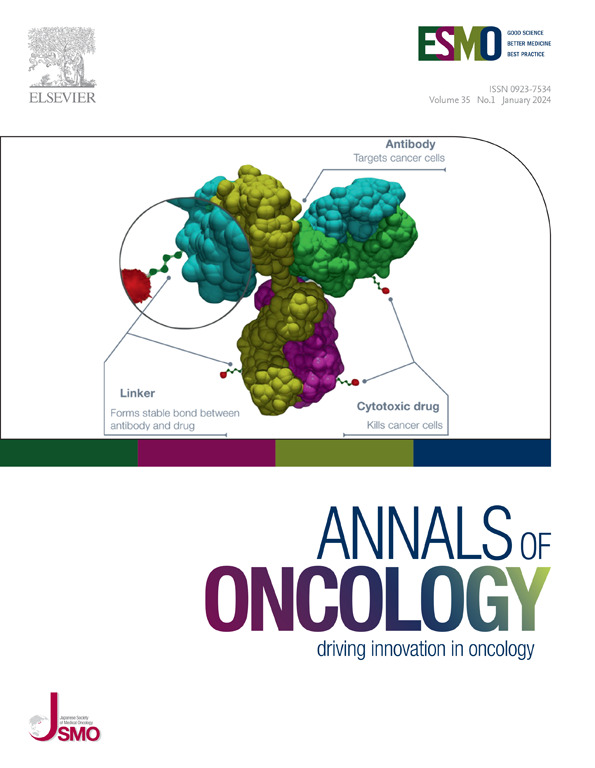Artificial intelligence entering the pathology arena in oncology: current applications and future perspectives
IF 56.7
1区 医学
Q1 ONCOLOGY
引用次数: 0
Abstract
Background
Artificial intelligence (AI) is rapidly transforming the fields of pathology and oncology, offering novel opportunities for advancing diagnosis, prognosis, and treatment of cancer.
Methods
Through a systematic review-based approach, the representatives from the European Society for Medical Oncology (ESMO) Precision Oncology Working Group (POWG) and international experts identified studies in pathology and oncology that applied AI-based algorithms for tumour diagnosis, molecular biomarker detection, and cancer prognosis assessment. These findings were synthesised to provide a comprehensive overview of current AI applications and future directions in cancer pathology.
Results
The integration of AI tools in digital pathology is markedly improving the accuracy and efficiency of image analysis, allowing for automated tumour detection and classification, identification of prognostic molecular biomarkers, and prediction of treatment response and patient outcomes. Several barriers for the adoption of AI in clinical workflows, such as data availability, explainability, and regulatory considerations, still persist. There are currently no prognostic or predictive AI-based biomarkers supported by level IA or IB evidence. The ongoing advancements in AI algorithms, particularly foundation models, generalist models and transformer-based deep learning, offer immense promise for the future of cancer research and care. AI is also facilitating the integration of multi-omics data, leading to more precise patient stratification and personalised treatment strategies.
Conclusions
The application of AI in pathology is poised to not only enhance the accuracy and efficiency of cancer diagnosis and prognosis but also facilitate the development of personalised treatment strategies. Although barriers to implementation remain, ongoing research and development in this field coupled with addressing ethical and regulatory considerations will likely lead to a future where AI plays an integral role in cancer management and precision medicine. The continued evolution and adoption of AI in pathology and oncology are anticipated to reshape the landscape of cancer care, heralding a new era of precision medicine and improved patient outcomes.
人工智能进入肿瘤病理领域:当前应用和未来展望。
背景:人工智能(AI)正在迅速改变病理学和肿瘤学领域,为推进癌症的诊断、预后和治疗提供了新的机会。方法:通过基于系统评价的方法,来自欧洲肿瘤医学学会(ESMO)精确肿瘤工作组(POWG)的代表和国际专家确定了病理学和肿瘤学领域应用基于人工智能的算法进行肿瘤诊断、分子生物标志物检测和癌症预后评估的研究。综合这些发现,提供了当前人工智能应用和癌症病理学未来方向的全面概述。结果:人工智能工具在数字病理学中的集成显著提高了图像分析的准确性和效率,允许自动检测和分类肿瘤,识别预后分子生物标志物,预测治疗反应和患者预后。在临床工作流程中采用人工智能的几个障碍,如数据可用性、可解释性和监管考虑,仍然存在。目前还没有IA级或IB级证据支持的基于人工智能的预后或预测性生物标志物。人工智能算法的不断进步,特别是基础模型、通才模型和基于转换器的深度学习,为癌症研究和护理的未来提供了巨大的希望。人工智能还促进了多组学数据的整合,从而导致更精确的患者分层和个性化治疗策略。结论:人工智能在病理学中的应用不仅可以提高癌症诊断和预后的准确性和效率,还可以促进个性化治疗策略的制定。尽管实施的障碍仍然存在,但该领域正在进行的研究和开发,加上解决伦理和监管方面的考虑,可能会导致人工智能在癌症管理和精准医疗中发挥不可或缺的作用。人工智能在病理学和肿瘤学领域的持续发展和应用预计将重塑癌症治疗的格局,预示着精准医疗和改善患者预后的新时代的到来。
本文章由计算机程序翻译,如有差异,请以英文原文为准。
求助全文
约1分钟内获得全文
求助全文
来源期刊

Annals of Oncology
医学-肿瘤学
CiteScore
63.90
自引率
1.00%
发文量
3712
审稿时长
2-3 weeks
期刊介绍:
Annals of Oncology, the official journal of the European Society for Medical Oncology and the Japanese Society of Medical Oncology, offers rapid and efficient peer-reviewed publications on innovative cancer treatments and translational research in oncology and precision medicine.
The journal primarily focuses on areas such as systemic anticancer therapy, with a specific emphasis on molecular targeted agents and new immune therapies. We also welcome randomized trials, including negative results, as well as top-level guidelines. Additionally, we encourage submissions in emerging fields that are crucial to personalized medicine, such as molecular pathology, bioinformatics, modern statistics, and biotechnologies. Manuscripts related to radiotherapy, surgery, and pediatrics will be considered if they demonstrate a clear interaction with any of the aforementioned fields or if they present groundbreaking findings.
Our international editorial board comprises renowned experts who are leaders in their respective fields. Through Annals of Oncology, we strive to provide the most effective communication on the dynamic and ever-evolving global oncology landscape.
 求助内容:
求助内容: 应助结果提醒方式:
应助结果提醒方式:


